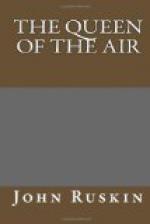* And by modern science now also asserted, and with probability argued, to exist.
11. The rule of the first spirit, Demeter, the earth mother, is over the earth, first, as the origin of all life,—the dust from whence we were taken; secondly, as the receiver of all things back at last into silence —“Dust thou art, and unto dust shalt thou return.” And, therefore, as the most tender image of this appearing and fading life, in the birth and fall of flowers, her daughter Proserpine plays in the fields of Sicily, and thence is torn away into darkness, and becomes the Queen of Fate—not merely of death, but of the gloom which closes over and ends, not beauty only, but sin, and chiefly of sins the sin against the life she gave; so that she is, in her highest power, Persephone, the avenger and purifier of blood—“The voice of thy brother’s blood cries to me out of the ground.” Then, side by side with this queen of the earth, we find a demigod of agriculture by the plough—the lord of grain, or of the thing ground by the mill. And it is a singular proof of the simplicity of Greek character at this noble time, that of all representations left to us of their deities by their art, few are so frequent, and none perhaps so beautiful, as the symbol of this spirit of agriculture.
12. Then the dominant spirit of the element water is Neptune, but subordinate to him are myriads of other water spirits, of whom Nereus is the chief, with Palaemon, and Leucothea, the “white lady” of the sea; and Thetis, and nymphs innumerable who, like her, could “suffer a sea change,” while the river deities had each independent power, according to the preciousness of their streams to the cities fed by them,—the “fountain Arethuse, and thou, honoured flood, smooth sliding Mincius, crowned with vocal reeds.” And, spiritually, this king of the waters is lord of the strength and daily flow of human life—he gives it material force and victory; which as the meaning of the dedication of the hair, as the sign of the strength of life, to the river or the native land.
13. Demeter, then, over the earth, and its giving and receiving of life. Neptune over the waters, and the flow and force of life,—always among the Greeks typified by the horse, which was to them as a crested sea-wave, animated and bridled. Then the third element, fire, has set over it two powers: over earthly fire, the assistant of human labor, is set Hephaestus, lord of all labor in which is the flush and the sweat of the brow; and over heavenly fire, the source of day, is set Apollo, the spirit of all kindling, purifying, and illuminating intellectual wisdom, each of these gods having also their subordinate or associated powers,— servant, or sister, or companion muse.




